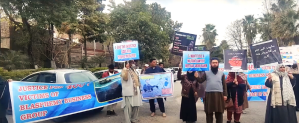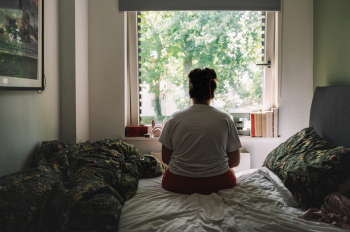
Religious freedom in Pakistan is facing unprecedented threats as Muslim extremist groups increase their hold on public officials, according to a report by the Human Rights Commission of Pakistan (HRCP).
The report, “Streets of Fear: Freedom of Religion or Belief in 2024/25,” which documents violations of such freedoms between July 1, 2024 and June 30, noted Muslim extremists were exerting growing pressure on the judiciary and elected officials through propaganda and intimidation.
“The rise in hate speech – ranging from threats against the chief justice of the Supreme Court to public vilification of elected representatives – points to shrinking civic space and emboldened extremist elements,” the HRCP report stated.
It also noted with concern an increasing tilt by bar associations toward positions aligned with Muslim extremist groups, a trend that undermines the independence of the legal profession.
The report documented targeted killings, forced conversions of minority girls, mob lynchings, hate speech, desecration of places of worship and extrajudicial killings rooted in blasphemy allegations. Highlighted several cases of people killed over blasphemy accusations, the report described the trend as deeply troubling in a country that has already witnessed the assassination of a provincial governor by his own police guard.
The report also noted that a pattern of minor non-Muslim girls disappearing and later resurfacing after allegedly converting to Islam and marrying Muslim men persisted during the period.
“Hindus in Sindh, who form 8.8 % of the population, and Christians in Punjab (1.9%), have raised repeated concerns,” the study stated. “A fact-finding study found that forced conversions and coerced marriages remain most prevalent among Scheduled Caste Hindus due to poverty and limited social mobility.”
The report highlighted the role of Sindh-based Islamist cleric-politician Mian Abdul Haq, also known as Mian Mithu, who is accused of using his influence to facilitate conversions of minor Hindu girls at his seminary in Ghotki, Sindh Province. The United Kingdom sanctioned him in 2022, it noted.
The report also cited cases where police were seen siding with abductors, often claiming that it would be Haram (forbidden) to return a girl to her family after her Islamic conversion. Faisalabad police in July 2024 recovered Christian minor Laiba Suhail, abducted in February 2024 and forcibly converted before being married off illegally. Another Christian girl, Alina, is still missing. In January, a Mirpurkhas court heard a plea from a couple accused of forcing an underage Hindu girl to convert and marry.
The HRCP emphasized that such cases continue to deepen insecurity among religious minorities and called for protective measures to safeguard vulnerable children and their families.
Highlighting misuse of the blasphemy laws to settle personal scores or seek financial gain, the report noted that a “mere accusation of blasphemy can be a death sentence.”
“Although false accusations continued during the reporting period, many were acquitted by the courts, further confirming the malicious intent behind these charges,” the report stated.
In October 2024, Christian sisters Saima and Sonia, accused of blasphemy about two months earlier, were released on bail by a Toba Tek Singh sessions court after reviewing the evidence. The women, from a village in Tehsil Gojra, were charged with discarding a sack containing sacred inscriptions into an empty plot.
“Similarly, in June 2025, the Supreme Court ended Anwar Kenneth’s 23-year-long ordeal after a three-judge bench acquitted him on the grounds of being of unsound mind,” the report stated. “Also in June 2025, a 25-year-old Christian man named Farhan Masih from Sahiwal was acquitted of blasphemy charges against him under Sections 295-A and 298-A of the Pakistan Penal Code and Section 7 of the Anti-Terrorism Act 1997. The trial judge ruled that the prosecution failed to prove its case beyond a reasonable doubt. Farhan, a mentally ill and impoverished Christian, was charged under anti-terrorism laws and spent nearly five months in prison.”
The report also showed that the mainstream media largely ignored issues of religious freedom. Even the Islamabad High Court’s hearings into the “blasphemy business group,” affecting nearly 400 households and livestreamed for four months, drew little coverage in the national press. Likewise, cases of coerced marriages, forced conversions and violence against minorities rarely made headlines, it noted.
The report also listed multiple killings of minority Ahmadis: dentist Zakaur Rahman in Lalamusa (July 2024), Tayyab Ahmad in Rawalpindi (December 2024), Amir Hasan in Naukot (December 2024), Laeeq Cheema in Karachi (April 2025), Muhammad Asif in Kasur (April 2025) and senior doctor Mahmood Sheikh in Sargodha (May 2025).
“According to the data provided by the Ahmadiyya community, 29 Ahmadi places of worship were attacked and damaged during the review period,” stated the HRCP report.
In 26 cases, demolitions were carried out by law enforcement agencies. These incidents occurred in Okara, Khanewal, Gujranwala, Sialkot, Vehari, Sheikhupura, Gujrat, and Sargodha, among other locations in Punjab Province. In January, a historic Sialkot site linked to Pakistan’s first foreign minister and an Ahmadi, Zafarullah Khan, was “reduced to rubble.”
Despite these challenges, the report acknowledged limited progress, including the passage of the Child Marriage Restraint Act 2025, which raises the legal age for marriage for girls to 18, and provincial legislation establishing research-based centers of excellence on countering violent extremism.
“The provincial assemblies of Balochistan, Punjab, and Khyber Pakhtunkhwa should also prioritize passing laws that set the minimum marriage age for both men and women at 18, ensuring uniformity in the age of marriage across Pakistan,” it stated. “According to reports, these bills are at various stages of review in the respective provincial legislatures.”
Among other recommendations, the HRCP strongly urged the federal government to establish an inquiry commission based on the findings of the National Commission for Human Rights with respect to entrapment in allegations of blasphemy. The authorities should also monitor those seminaries that are frequently involved in the conversion of underage girls, it demanded.
It said that law enforcement forces also need to be better equipped to protect individuals from mob violence, with vital police training in intelligence gathering, crowd management, reading early signals of riots, and community policing. Moreover, swift action should be taken against those who instigate such mobs.
“As recommended in the HRCP’s previous reports, the government must urgently establish an independent statutory national commission dedicated to the rights of minorities, ensuring equal representation for all religious communities,” it concluded.
Pakistan ranked eighth on Open Doors’ 2025 World Watch List of the most difficult places to be a Christian.






